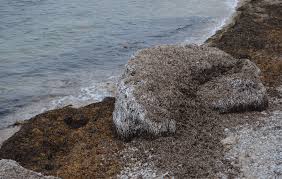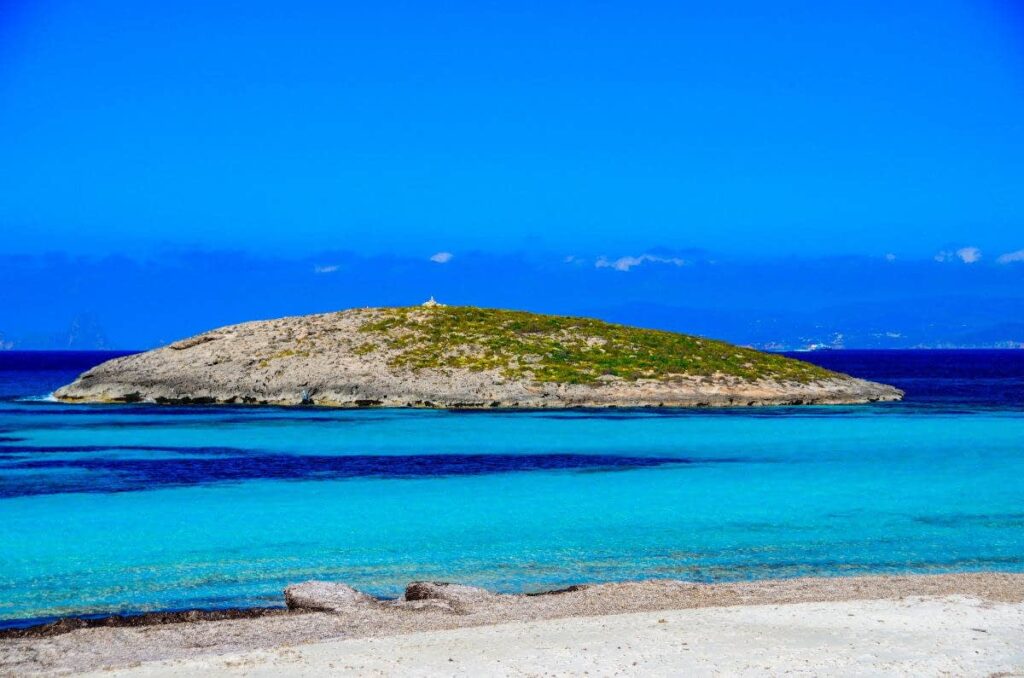Posidonia oceanica is the plant that makes the sea waters so transparent. It is recognized by the black spots that can be seen from the surface, which can form real meadows of several kilometers long, such as the one in Formentera of more than 8 km.
It is the longest living being on earth at 100,000 years. It only grows one centimeter each year and lives at a depth of between 1 and 40 meters.
It not only protects the coast from waves and tides, but also helps to consolidate the sand on the beaches. Posidonia is the lung of the Mediterranean as it captures and retains CO2 for millions of years. Just one hectare of Posidonia meadow creates 5 times more oxygen than one hectare of Amazon rainforest.
 As the Mediterranean Sea is the border of so many countries, its uses and history are rich. As it has a lot of salt, even when wet it does not create bacteria or fungi, so it is used as bedding for livestock. It is perfect for insulating from the cold and, thanks to its high iodine content, keeps livestock clean and disinfected. It is also very beneficial to the field because it releases nutrients as it decomposes, retains dew and prevents water evaporation. There are even fishermen who used to macerate them in alcohol to obtain a disinfectant solution to treat scratches and other superficial wounds and help them heal.
As the Mediterranean Sea is the border of so many countries, its uses and history are rich. As it has a lot of salt, even when wet it does not create bacteria or fungi, so it is used as bedding for livestock. It is perfect for insulating from the cold and, thanks to its high iodine content, keeps livestock clean and disinfected. It is also very beneficial to the field because it releases nutrients as it decomposes, retains dew and prevents water evaporation. There are even fishermen who used to macerate them in alcohol to obtain a disinfectant solution to treat scratches and other superficial wounds and help them heal.
More importantly, posidonia is vital for fish reproduction; it provides the habitat where millions of species of marine plants and animals feed and reproduce.
However, although it is one of the main sources of life in the Mediterranean, today more than half of the grasslands have disappeared. There are several causes, such as waste dumping, trawling, uncontrolled coastal construction, among others.
 For this reason, the Conselleria de Medi Ambient del Govern de les Illes Balears responded to the need to adopt measures for the conservation of the meadows by developing and implementing the project “Protection of Posidonia meadows in SCI areas of the Balearic Islands”.
For this reason, the Conselleria de Medi Ambient del Govern de les Illes Balears responded to the need to adopt measures for the conservation of the meadows by developing and implementing the project “Protection of Posidonia meadows in SCI areas of the Balearic Islands”.
This project received European funding by decision of the Commission of July 5, 2001, within the framework of the LIFE (regulations governing the financial instrument for the environment) and has the participation of the Directorate General of Fisheries, the Fundació Bosch i Gimpera, and the Mediterranean Institute of Advanced Studies.
To go further, the Consell Insular of the island of Formentera (Balearic Islands) proposed to launch an action plan called Save Posidonia Project to raise funds that will go exclusively to the conservation of the marine plant Posidonia oceanica. The objective is to “raise awareness of the vital importance of posidonia in Formentera in the present and especially for future generations”.
The action of the Balearic Government has meant the deployment of boats to monitor anchorages and raise awareness among small and medium-sized vessels about the danger of anchoring on posidonia meadows. These surveillance units control and inform about the rules of management and use of the buoys, as well as the need to reserve anchorages according to the season of the year, and non-compliance is a punishable offense. To learn more visit their website by clicking here.
If more than half of the oxygen we breathe comes from the sea, it is not unreasonable to take care of it as much as possible.
